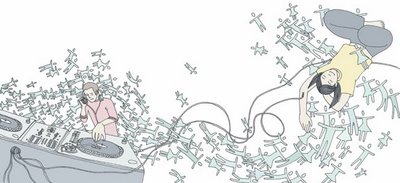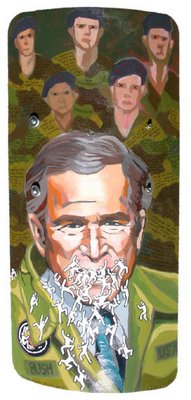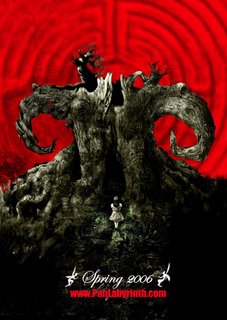Soma FM: currently my favorite radio station . Lot's of good ambient, good variety. Definitely thumbs up. Try "Cliquehop" and "Beat Blender."
(the bit-rate on campus usually sucks, but it's worth a try, I promise. You can access Soma on iTunes as well.)
Radio Io: one of the more consistent radio stations. good selections of imports - give it a try. (the commercials are bad ... just turn down the dial)
ioBeat - house music, ambient, etc. (usually better at night)
ioEdge - also very good. indie rock, new music, etc.
Any recommendations?
Sunday, April 30, 2006
Film 101: the Cinema is a Black Mass
Some poison-enveloped candy, via literary critic Walter Benjamin,
"Art in the Age of Mechanical Reproduction:"
Thanks to the camera, therefore, the individual perceptions of the psychotic or the dreamer can be appropriated by collective perception. The ancient truth expressed by Heraclitus, that those who awake have a world in common while each sleeper has a world of his own has been invalidated by film – and less by depicting the dream world itself than by creating figures of collective dream such as the globe-encircling Mickey Mouse.
The representation of human beings by means of an apparatus has made possible a highly productive use of the human being’s self-alienation … Not only does the cult of the movie star which it fosters preserve that magic of the personality which has long been no more than the putrid magic of its own commodity character, but its counterpart, the cult of the audience, reinforces the corruption by which fascism is seeking to supplant the class consciousness of the masses.
All this in order to distort and corrupt the original and justified interest of the masses in film – an interest in understanding themselves and therefore their class. Thus, the same is true of film capital in particular as of fascism in general: a compelling urge toward new social opportunities is being clandestinely exploited in the interests of a property-owning minority.
Working on my Modern Art final as well as my Aesthetics paper, Benjamin and Deleuze in-hand. Seriously though, Benjamin is an incredibly lucid thinker - beautiful and dead-on-target with his assessments of politics, art, and the commercial age. He died in 1940 - and he achieved so much. I'm amazed.
"Art in the Age of Mechanical Reproduction:"
Thanks to the camera, therefore, the individual perceptions of the psychotic or the dreamer can be appropriated by collective perception. The ancient truth expressed by Heraclitus, that those who awake have a world in common while each sleeper has a world of his own has been invalidated by film – and less by depicting the dream world itself than by creating figures of collective dream such as the globe-encircling Mickey Mouse.
The representation of human beings by means of an apparatus has made possible a highly productive use of the human being’s self-alienation … Not only does the cult of the movie star which it fosters preserve that magic of the personality which has long been no more than the putrid magic of its own commodity character, but its counterpart, the cult of the audience, reinforces the corruption by which fascism is seeking to supplant the class consciousness of the masses.
All this in order to distort and corrupt the original and justified interest of the masses in film – an interest in understanding themselves and therefore their class. Thus, the same is true of film capital in particular as of fascism in general: a compelling urge toward new social opportunities is being clandestinely exploited in the interests of a property-owning minority.
Working on my Modern Art final as well as my Aesthetics paper, Benjamin and Deleuze in-hand. Seriously though, Benjamin is an incredibly lucid thinker - beautiful and dead-on-target with his assessments of politics, art, and the commercial age. He died in 1940 - and he achieved so much. I'm amazed.
Max Ernst
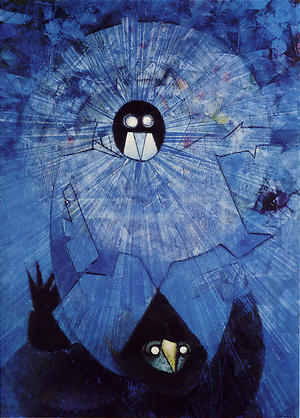
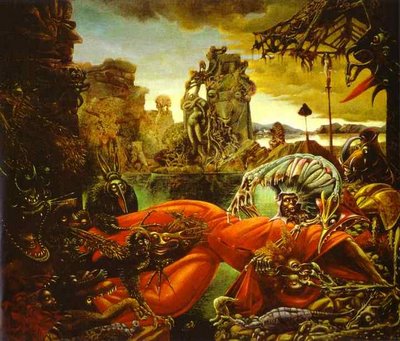
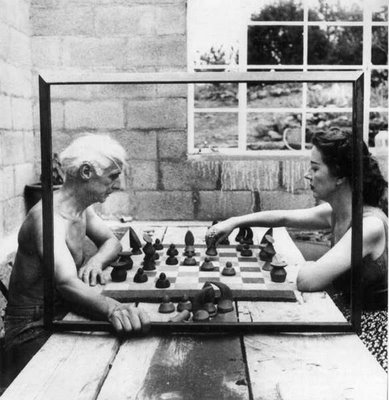
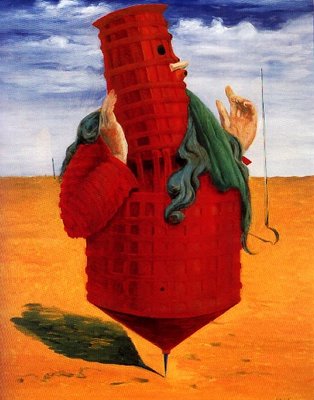
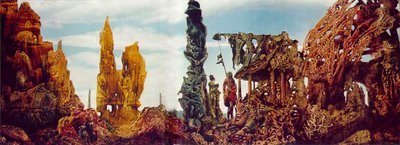
(Click that last thumbnail)
Georges Bataille on Max Ernst:
What is the foundation of the turbulent and violent world of Max Ernst if no the catastrophic substitution of a game, of an end in itself, for the laborious work with a view to a desired result? The serious philosopher conceives philosophy as a laborious activity and in so doing he imitates carpenters and locksmiths ... He constructs his philosophical furniture, a well-oiled philosophy responding as a lock does to the key made for it. The person who recognizes the powerlessness of work, on the contrary is dazzled and fascinated by the play which serves no purpose.
If he announces, if he calls for, the death of philosophy, the philosopher who plays sees in him a brother, Max Ernst. Next to this friend he accepts being swallowed up in this collapse of the real, in which death, half-glimpsed, compellingly represents the decisive move, in which the world, as it ceases to exist, falls apart; where thought is only the measureless applause given to the death of thought.
Thursday, April 27, 2006
Sunday, April 09, 2006
Faulkner
On of my favorite Faulkner moments - the prisoner, stalking for alligators (the Cajun with him) lost in forgotten Mississippi-Louisiana swamp, somewhere in the flood-sunken abyss below Vicksburg. From If I Forget Thee, Jerusalem [The Wild Palms]:
Doubtless he did not know himself how it happened, what was happening. But he doubtless remembered it (but quietly above the thick) rich-colored pristine cigar in his clean steady hand) what he knew, divined of it. It would be evening, the ninth evening, he and the woman on either side of their host's empty place at the evening meal, hearing the voices from without but no ceasing to eat, still chewing steadily, because it would be the same as though he were seeing them anyway - the two or three or four pirogues floating on the dark water beneath the platform on which the host stood, the voices gobbling and jabbering, incomprehensible and filled not with alarm and not exactly with rage or even perhaps absolute surprise but rather just cacophony like those of disturbed fowl, he (the convict) not ceasing to chew but just looking up quietly and maybe without a great deal of interrogation or surprise too as the Cajun burst in and stood before them, wild-faced, glaring his blackened teeth gaped against the the inky orifice of his distended mouth, watching (the convict) while the Cajun went through his violent pantomime of violent evacuation, ejection, scooping something invisible into his arms and hurling it out and downward and in the instant of completing the gesture changing from instigator to victim of that which he had set into pantomimic motion, clasping his head and, bowed over and not otherwise moving, seeming to be swept on and away before it, braying "Boom! Boom! Boom!", the convict watching him, his jaw not chewing now, though for just that moment, What? What is it he is trying to tell me? thinking (this a flash too, since he could not have expressed this, and hence did not even know that he had ever thought it) that though his life had been cast here, circumscribed by this environment, accepted by this environment and accepting it in turn (and he had done well here - this quietly, soberly indeed, if he had been able to phrase it, think of it instead of merely knowing it - better than he had ever done, who had not even known until now how good work, making money, could be) yet it was not his life, he still and could ever be no more than the water bug upon the surface of the pond, the blumbless and lurking depths of which he would never know, his only contact with it being the instants when on lonely and glaring mudspits under the pitiless sun amphitheatred by his motionless and rivetted semicircle of watching pirogues, he accepted the gambit which he had not elected, entered the lashing radius of the armed tail and beat at the thrashing and hissing head with his lightwood club, or this failing, embraced without hesitation the armored body itself with the frail web of flesh and bone in which he walked and lived and sought the raging life with an eight-inch knife-blade.
One paragraph: three sentences. Also, Faulkner never actually uses the word 'alligator.'
Doubtless he did not know himself how it happened, what was happening. But he doubtless remembered it (but quietly above the thick) rich-colored pristine cigar in his clean steady hand) what he knew, divined of it. It would be evening, the ninth evening, he and the woman on either side of their host's empty place at the evening meal, hearing the voices from without but no ceasing to eat, still chewing steadily, because it would be the same as though he were seeing them anyway - the two or three or four pirogues floating on the dark water beneath the platform on which the host stood, the voices gobbling and jabbering, incomprehensible and filled not with alarm and not exactly with rage or even perhaps absolute surprise but rather just cacophony like those of disturbed fowl, he (the convict) not ceasing to chew but just looking up quietly and maybe without a great deal of interrogation or surprise too as the Cajun burst in and stood before them, wild-faced, glaring his blackened teeth gaped against the the inky orifice of his distended mouth, watching (the convict) while the Cajun went through his violent pantomime of violent evacuation, ejection, scooping something invisible into his arms and hurling it out and downward and in the instant of completing the gesture changing from instigator to victim of that which he had set into pantomimic motion, clasping his head and, bowed over and not otherwise moving, seeming to be swept on and away before it, braying "Boom! Boom! Boom!", the convict watching him, his jaw not chewing now, though for just that moment, What? What is it he is trying to tell me? thinking (this a flash too, since he could not have expressed this, and hence did not even know that he had ever thought it) that though his life had been cast here, circumscribed by this environment, accepted by this environment and accepting it in turn (and he had done well here - this quietly, soberly indeed, if he had been able to phrase it, think of it instead of merely knowing it - better than he had ever done, who had not even known until now how good work, making money, could be) yet it was not his life, he still and could ever be no more than the water bug upon the surface of the pond, the blumbless and lurking depths of which he would never know, his only contact with it being the instants when on lonely and glaring mudspits under the pitiless sun amphitheatred by his motionless and rivetted semicircle of watching pirogues, he accepted the gambit which he had not elected, entered the lashing radius of the armed tail and beat at the thrashing and hissing head with his lightwood club, or this failing, embraced without hesitation the armored body itself with the frail web of flesh and bone in which he walked and lived and sought the raging life with an eight-inch knife-blade.
One paragraph: three sentences. Also, Faulkner never actually uses the word 'alligator.'
Wednesday, April 05, 2006
April
Gravity's Rainbow - have copy. Prose like ribbons of Stygian glee, riddled with machine gun fire. The magazine drops, metallic echoes of warfare: the Art of angels.
A: There is no more class.
Q: What about reading?
A: No, none of that. Save what pleases.
Q: Thesis?
A: You know what to do.
A: There is no more class.
Q: What about reading?
A: No, none of that. Save what pleases.
Q: Thesis?
A: You know what to do.
Sunday, April 02, 2006
Roland Barthes: Operation Margarine?
Since myth is a type of speech, everything can be a myth provided it is conveyed by a discourse. Everything can be a myth? Yes, I believe this, for the universe is infinitely fertile in suggestions.
Einstein's brain is a mythical object. Paradoxically, the more the genius of the man was materialized under the guise of his brain, the more the product of his inventiveness came to acquire a magical dimension, and gave a new incarnation to the old esoteric image of a science entirely contained in a few letters: E=mc2. There is a single secret to the world, and this secret is held in one word; the universe is a safe of which humanity seeks the combination: Einstein almost found it, this is the myth of Einstein. In it, we find all the Gnostic themes: the unity of nature, the ideal possibility of a fundamental reduction of the world, the unfastening power of the word, the age-old struggle between a secret and an utterance, the idea that total knowledge can only be discovered all at once, like a lock which suddenly opens after a thousand unsuccessful attempts.
Actually, like all resilient totems, wine supports a varied mythology which does not trouble about contradictions. This galvanic substance is always considered, for instance as the most efficient of thirst-quenchers, or at least this serves as the major alibi for its consumption ('It's thirsty weather'). In its red form, it has blood, the dense and vital fluid, as a very old hypo-stasis. This is because in fact its humoral form matters little; it is above all a converting substance, capable of reversing situations and states, and of extracting from objects their opposites - for instance, making a weak man strong or a silent one talkative. Hence its old alchemical heredity, its philosophical power to transmute and create ex nihilo.
Myth is a language that does not want to die: it wrests from the meanings which give it its sustenance an insidious, degraded survival, it provokes in them an artificial reprieve in which it settles comfortably, it turns them into speaking corpses.
Modern poetry always asserts itself as a murder of language, a kind of spatial, tangible analogue of silence. Poetry occupies a position which is the reverse of that of myth: myth is a semiological system which has the pretension of transcending itself into a factual system.
Statistically, myth is on the right … The oppressed is nothing, he has only one language, that of his emancipation; the oppressor is everything, his language is rich, multiform, supple, with all the possible degrees of dignity at its disposal: he has an exclusive right to meta-language.
Also, one very cool Barthes-ism:
“Operation Magarine” - the mystifying device by which political systems inoculate the public with “a touch of evil.” The people are relieved of the system’s greater evils by distraction via the admittance of a lesser evil. For example, perhaps the contemporary debate over stem cell research is a type of ‘operation margarine’: it distracts the public from the real evils of the medical establishment - the all consuming money-bureaucracy that robs control from doctors as well as patients, who are now considered “health consumers” rather than real human beings.
Einstein's brain is a mythical object. Paradoxically, the more the genius of the man was materialized under the guise of his brain, the more the product of his inventiveness came to acquire a magical dimension, and gave a new incarnation to the old esoteric image of a science entirely contained in a few letters: E=mc2. There is a single secret to the world, and this secret is held in one word; the universe is a safe of which humanity seeks the combination: Einstein almost found it, this is the myth of Einstein. In it, we find all the Gnostic themes: the unity of nature, the ideal possibility of a fundamental reduction of the world, the unfastening power of the word, the age-old struggle between a secret and an utterance, the idea that total knowledge can only be discovered all at once, like a lock which suddenly opens after a thousand unsuccessful attempts.
Actually, like all resilient totems, wine supports a varied mythology which does not trouble about contradictions. This galvanic substance is always considered, for instance as the most efficient of thirst-quenchers, or at least this serves as the major alibi for its consumption ('It's thirsty weather'). In its red form, it has blood, the dense and vital fluid, as a very old hypo-stasis. This is because in fact its humoral form matters little; it is above all a converting substance, capable of reversing situations and states, and of extracting from objects their opposites - for instance, making a weak man strong or a silent one talkative. Hence its old alchemical heredity, its philosophical power to transmute and create ex nihilo.
Myth is a language that does not want to die: it wrests from the meanings which give it its sustenance an insidious, degraded survival, it provokes in them an artificial reprieve in which it settles comfortably, it turns them into speaking corpses.
Modern poetry always asserts itself as a murder of language, a kind of spatial, tangible analogue of silence. Poetry occupies a position which is the reverse of that of myth: myth is a semiological system which has the pretension of transcending itself into a factual system.
Statistically, myth is on the right … The oppressed is nothing, he has only one language, that of his emancipation; the oppressor is everything, his language is rich, multiform, supple, with all the possible degrees of dignity at its disposal: he has an exclusive right to meta-language.
Also, one very cool Barthes-ism:
“Operation Magarine” - the mystifying device by which political systems inoculate the public with “a touch of evil.” The people are relieved of the system’s greater evils by distraction via the admittance of a lesser evil. For example, perhaps the contemporary debate over stem cell research is a type of ‘operation margarine’: it distracts the public from the real evils of the medical establishment - the all consuming money-bureaucracy that robs control from doctors as well as patients, who are now considered “health consumers” rather than real human beings.
Subscribe to:
Comments (Atom)



